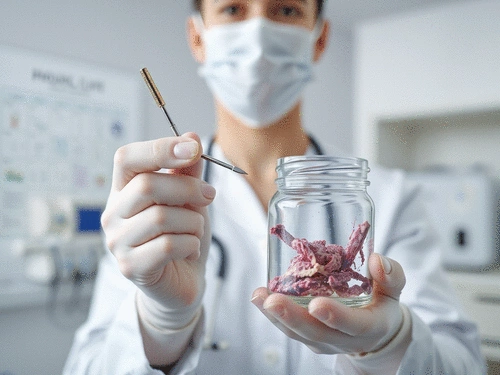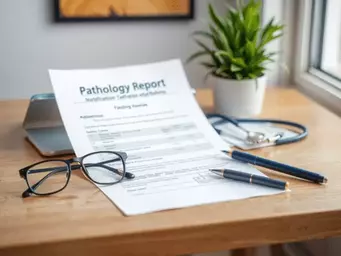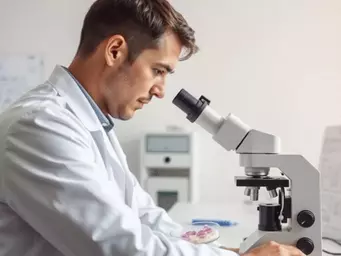What if a small tissue sample could unlock significant insights about your health? Understanding biopsies empowers you to take control of your medical journey and make informed decisions.
What You Will Learn
- Definition: A biopsy is a procedure to remove a small tissue sample for examination, aiding in accurate diagnosis.
- Purpose: Biopsies are vital for diagnosing conditions, especially cancer, and determining the best treatment options.
- Types of Biopsies: Common methods include needle biopsies, surgical biopsies, and skin biopsies, each serving specific diagnostic needs.
- Pathology's Role: Pathologists analyze tissue samples, ensuring accurate diagnoses and guiding treatment decisions based on their expert findings.
- Patient Empowerment: Knowledge about biopsies can reduce anxiety, allowing patients to engage more actively in their healthcare decisions.
Understanding Biopsies: Definition, Purpose, and Process
Biopsies are crucial medical procedures that help diagnose various health conditions by analyzing tissue samples. Below is a visual summary of the key aspects of biopsies, designed to clarify their definition, purpose, and the general process involved.
What is a Biopsy?
A medical procedure involving the removal of a small tissue sample for laboratory examination to diagnose health conditions.
Purpose of a Biopsy
To detect diseases (especially cancer), determine disease type, and guide the most effective treatment approach.
Biopsy Process & Types
Techniques vary (e.g., needle, surgical, skin biopsies) based on the body area and suspected condition.
- Needle Biopsy
- Surgical Biopsy
- Skin Biopsy
Pathology's Role
Pathologists examine tissue samples under a microscope for accurate diagnosis, identifying cellular changes and guiding treatment decisions.
Understanding the Biopsy: Definition and Overview
When you hear the word biopsy, it can sound a bit daunting, but don't worry! A biopsy is simply a procedure that involves taking a small sample of tissue from your body. This sample can be examined by a medical professional to help diagnose various health conditions. My goal at What Is A Biopsy is to provide you with clear and accessible information about this important medical procedure. Understanding the basics can significantly reduce your anxiety and help you feel more empowered about your health!
So, what is a biopsy really? It's a way for doctors to gather crucial information about your health. By examining tissue under a microscope, they can determine if there are any abnormalities, such as cancer or other diseases. This process is vital in guiding treatment options and decisions, making it an essential aspect of modern medicine. For more detailed information, you can refer to resources like the Mayo Clinic's comprehensive guide on biopsies.
What Is a Biopsy? A Clear Definition
A biopsy is a medical test that involves the removal of a small amount of tissue for examination. This can be done through various methods, depending on the area of the body being assessed. Here are a few key types of biopsies:
- Needle Biopsy: Uses a thin needle to extract tissue.
- Surgical Biopsy: Involves removing a larger tissue sample during surgery.
- Skin Biopsy: Focuses on skin lesions or abnormalities.
Through these methods, healthcare providers can obtain the necessary information to form a diagnosis. It's amazing how such a small sample can provide big insights into your health! The National Institutes of Health (NIH) provides further insights into the role of biopsies in modern diagnostics.
The Importance of Tissue Samples in Medical Diagnosis
Tissue samples play a crucial role in diagnosing various medical conditions. They help detect diseases at an early stage, allowing for timely and effective treatment. When a biopsy is performed, it can provide answers to important questions, such as:
- Is the tissue cancerous or benign?
- What type of disease is present?
- What is the best treatment approach?
By understanding the significance of tissue samples, patients can appreciate why biopsies are often a necessary step in their healthcare journey. It's all about getting the right information to make informed decisions about your health!
Pathology and Biopsy: Understanding Tissue Pathology
Pathology is the study of diseases, and it is intimately connected to the biopsy process. Once a tissue sample is collected, it is sent to a pathologist, who examines it under a microscope. This expert analysis is key to understanding what the tissue reveals about your health. Pathologists look for changes in the cells that can indicate disease processes.
Here are a few points to consider about pathology in relation to biopsies:
- Accuracy: Pathologists provide essential insights that lead to accurate diagnoses.
- Expertise: They are trained to identify subtle changes in tissue that may go unnoticed.
- Guidance: Their findings guide the treatment decisions made by your healthcare team.
Understanding how pathology works can help demystify the biopsy process. It's a fascinating field that plays a critical role in patient care, ensuring that you receive the most appropriate and effective treatment based on your specific diagnosis. For instance, the FDA provides detailed information regarding the regulatory aspects and importance of pathology in diagnostics.
Pro Tip
When preparing for a biopsy, consider keeping a journal of your thoughts and feelings. This can be a helpful way to process any anxiety you may have and allows you to articulate questions you want to ask your healthcare provider. Remember, being prepared can significantly reduce your stress and help you feel more in control of your health journey!
Frequently Asked Questions About Biopsies
What exactly is a biopsy?
A biopsy is a medical procedure where a small tissue sample is removed from your body for examination under a microscope. This helps doctors diagnose various health conditions, including cancer.
Why is a biopsy performed?
Biopsies are performed to detect diseases, particularly cancer, determine the specific type of disease, and guide healthcare providers in choosing the most effective treatment approach.
What are the common types of biopsies?
Common types include needle biopsies (using a thin needle), surgical biopsies (removing a larger sample during surgery), and skin biopsies (for skin lesions or abnormalities).
What is the role of a pathologist in the biopsy process?
Pathologists are medical experts who examine the tissue samples collected during a biopsy under a microscope. They identify cellular changes and abnormalities, providing an accurate diagnosis that is crucial for guiding treatment decisions.
How can I prepare for a biopsy to reduce anxiety?
To reduce anxiety, it's recommended to ask your healthcare provider questions, research the specific type of biopsy you will undergo, and consider connecting with support groups. Keeping a journal of your thoughts and questions can also be helpful.
Summarizing the Importance of Biopsies in Modern Medicine
Biopsies play a crucial role in modern medicine, serving as an essential tool for diagnosing various conditions. By obtaining tissue samples, healthcare providers can understand the nature of abnormalities more clearly, guiding treatment plans effectively. The biopsy process, while it may seem intimidating, is a small step towards uncovering significant health insights!
Here are some key points to remember about biopsies:
- Definition: A biopsy is a procedure where a small sample of tissue is removed for examination.
- Purpose: Biopsies help to diagnose diseases, particularly cancer, and guide treatment options.
- Process: The procedure can vary, involving different techniques such as needle biopsies or surgical excisions.
Understanding these elements of biopsies can empower patients to approach their healthcare journey with confidence. Knowledge is key to making informed decisions about your health!
Key Takeaways: Biopsy Definition, Purpose, and Process
To simplify our discussion, let’s recap the fundamental aspects of biopsies:
- What is a biopsy? A method for obtaining tissue samples to diagnose conditions accurately.
- Why are they performed? They are vital for confirming the presence of diseases, particularly in detecting cancer.
- How is a biopsy conducted? Different techniques, such as needle or surgical biopsies, are employed based on the situation.
By recognizing these key takeaways, you can see how biopsies fit into the larger puzzle of your healthcare. It’s a proactive step toward understanding your health better!
Empowering Patients: Understanding Biopsy to Make Informed Decisions
At What Is A Biopsy, we strive to empower patients by providing clear and compassionate information about biopsy procedures. As a board-certified pathologist, I understand the anxiety that often accompanies these procedures. That's why I emphasize the importance of being informed!
To help you make informed decisions about your health, consider the following:
- Ask questions: Don’t hesitate to reach out to your healthcare provider with any concerns or uncertainties.
- Research your procedure: Familiarize yourself with the specific type of biopsy you will undergo.
- Connect with support groups: Engaging with others who have been through similar experiences can provide comfort.
By taking these steps, you can navigate your biopsy journey with greater ease, transforming anxiety into understanding and empowerment. Remember, you’re not alone in this process!
Encouraging Further Engagement and Inquiry
Have More Questions? Join the Conversation on Biopsy Awareness
We believe in the power of community and conversation. If you have questions, thoughts, or experiences to share about biopsies, I invite you to engage with us! Your voice matters, and discussing these topics openly can help demystify the biopsy process for others.
Explore Resources for Support and Information on Biopsy Procedures
At What Is A Biopsy, we offer a wealth of resources designed to help you understand biopsy procedures. From doctor-reviewed articles to animations explaining each step, we are committed to providing the knowledge you need. Don’t forget to check out our Q&A guides tailored for your specific concerns!
Follow-Up Tests: What to Expect After a Biopsy
After your biopsy, it’s common to wonder about the next steps. Here’s what you can generally expect:
- Awaiting results: Your healthcare provider will inform you about when and how you will receive your results.
- Possible follow-up tests: Depending on the findings, additional tests may be required.
- Discussing results: Be prepared to discuss your results and treatment options with your healthcare team.
Staying informed and engaged after your biopsy can help you navigate the journey ahead with confidence!
Recap of Key Points
Here is a quick recap of the important points discussed in the article:
- Definition: A biopsy is a procedure where a small sample of tissue is removed for examination to diagnose health conditions.
- Purpose: Biopsies are crucial for confirming the presence of diseases, especially cancer, and guiding treatment options.
- Process: Various techniques, including needle and surgical biopsies, are used based on the area being assessed.
- Pathology's Role: Pathologists analyze tissue samples to provide accurate diagnoses and guide treatment decisions.
- Patient Empowerment: Patients should ask questions, research their procedures, and connect with support groups to navigate the biopsy process confidently.










